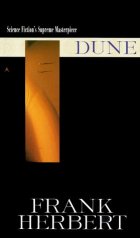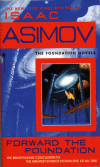Dune is by far one of the most famous classics in Sci-Fi, winner of both the Hugo and Nebula awards for best science fiction novel in 1966. I am ashamed to say that I am just now getting around to reading it. I have of course seen the original theatrical movie, the Sci-Fi Channel remake, and subsequent mini-series Children of Dune. I have just vague memories of the original movie and don’t really remember much of the Sci-Fi Channel remake or Children of Dune. I wanted to see for myself the vision that Frank Herbert had for Dune, and then compare it to the movies afterwards. Keep an eye out for a DVD review of both the original movie and the Sci-Fi movie in the near future.
Frank Herbert includes a series of appendixes, glossary, and map at the end of Dune. I chose not to read any of the appendixes or glossary to see how much of the details are described throughout the novel. My first impression is that Herbert plunges the reader directly into a galaxy full of history and mysteries. I felt like the first few chapters, or even novels, had been left out. Herbert clearly spent a lot of time developing the history and background of the characters and worlds for this novel. The appendixes are very helpful, but I think there are too many spoilers for me to recommend reading them before diving into the novel.
Aside from a brief moment on Caldaan, the home world of House Atreides, most of the novel takes place on the desert planet known as Dune, properly named Arrakis. House Atreides was ordered by the Emperor to take control of Dune from House Harkonnen. This has a great impact on sphere of politics and economics because Melange, a spice only able to be mined on Arrakis, is the most valuable substance in the universe. It allows the Spacing Guild to navigate across space, and much of royalty consumes it to extend their own lifetimes. Because there is a blood feud between House Atreides and House Harkonnen, Duke Leto Atreides is certain that the shift in control of Arrakis is a trap in disguise. He faces his fate with courage nonetheless.
The main story arc covers the transformation of Paul Atreides, son of Duke Leto Atreides, from a young boy of 15 into a savior of the Fremen on Arrakis. Duke Leto attempts provide last minute guidance to his son, emphasizing the importance of the Fremen to the survival of House Atreides. Fremen are a race perfectly adapted to the harsh desert environment of the most valuable planet in the galaxy. The Harkonnen treated these people as pests, but Duke Leto predicted quite correctly that they would be an invaluable resource to House Atreides.
Dune begins with Paul, pretending to be asleep, overhearing his mother, Lady Jessica (Duke Leto’s concubine), speaking with an old lady about the possibility of him being the “Kwisatz Haderach.” He is to be tested the next day with something called a “gom jabbar.” Herbert goes through no effort to explain to the reader what any of these terms are at this point. These are explained briefly in the glossary, but I chose not to refer to it while reading so that I could learn about these things as Paul does.
Herbert goes through great care to feed information to the reader bit by bit, unveiling a complex feudal society filled with plenty of backstabbing and secret motives. Hand to hand combat training is very important to royalty, and the analogy of feints is used frequently to describe the shady dealings between the Great Houses. Treachery is always around the corner, evidenced by the advanced “poison snoopers” which scan all food before royalty consumes it.
An interesting theme which reminds me a bit of Isaac Asimov’s work is the stigma against artificial intelligence. Paul quotes an important law,
‘Thou shalt not make a machine in the likeness of a man’s mind’
This aversion to thinking machines goes much farther than simply banning robots as Asimov describes. To adapt to life without thinking machines, special humans like Paul are trained to be “Mentats,” or human computers capable of logical computation. This concept might have seemed a bit far-fetched in 1965, but from what I’ve seen recently of a man reciting Pi to 100,000 places, it now seems plausible.
The complexity of Dune is probably a reason it is hailed as one of the best science fiction novels of all time. The Bene Gesserit (referred to as female “witches”), Spacing Guild, Great Houses, CHOAM, and the Fremen are all tied together by one element, the spice melange on Arrakis. One of the most important components of Dune is the religion and customs of the Fremen. Herbert goes through great effort, and succeeds, in introducing a rich culture with unique beliefs and customs. This and the meddlesome nature of the Bene Gesserit make for a gripping story full of surprises.
Dune is definitely a must read for any science fiction fan, or anyone interested in exploring this genre for the first time. Frank Herbert doesn’t rely on heavily incorporating technology into this novel, but rather focuses on the complex interactions between the characters and various groups in society. Although Dune is just the beginning of a series that spawned 5 sequels and numerous prequels, I think that it stands alone quite well.



Reading your review, I was struck by how similar, in terms of the complexity and basic elements, Dune is the the Wheel of Time.
I had been thinking about how it was a classic young hero destined for something greater than he could have imagined. I can see how the Bene Geserit are very similar to the Aes Sedai in the Wheel of Time. They are both powerful in the ways of magic and and interfere in politics. Also, in both series the women are the ones that have the magical powers, opposed to the men. The Wheel of Time has crazy men that have to be killed because they cannot control their power (Rand being one of the first of the Age able to stave off madness), and Dune has Paul be the first to have the power Bene Geserit have. I guess the one main difference, at least as far as Dune being viewed by itself, is that there isn’t a powerful evil nemesis trying to destroy the world.